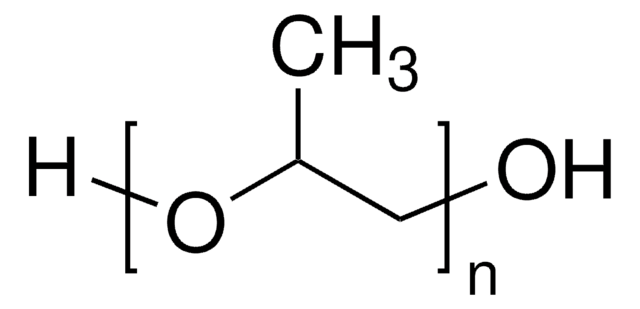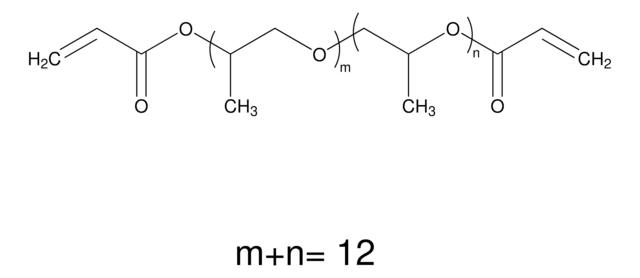81350
Polypropylene glycol
P 400
Synonym(s):
1,2-propanediol
Sign Into View Organizational & Contract Pricing
All Photos(1)
About This Item
CAS Number:
MDL number:
UNSPSC Code:
12162002
PubChem Substance ID:
NACRES:
NA.23
Recommended Products
Quality Level
form
liquid
mol wt
Mn 446
refractive index
n20/D 1.447
viscosity
~100 mPa.s(20 °C)
solubility
water: miscible (completely)
density
1.01 g/mL at 20 °C
SMILES string
O(C(CO)C)CC(O)C
InChI
1S/C6H14O3/c1-5(8)4-9-6(2)3-7/h5-8H,3-4H2,1-2H3
InChI key
DUFKCOQISQKSAV-UHFFFAOYSA-N
Looking for similar products? Visit Product Comparison Guide
Related Categories
General description
Propylene glycol is an aliphatic alcohol. It is an addition polymer of propylene glycol and water represented as H[OCH3]nOH in which n represents the average number of oxypropylene groups.
Application
Propylene glycol (PPG) may be used as a viscosity decreasing agent, a solvent and a fragrance ingredient in cosmetics. PPG may be used as a good swelling agent for the synthesis of large pore mesoporous materials.
Storage Class Code
10 - Combustible liquids
WGK
WGK 1
Flash Point(F)
201.2 °F - closed cup
Flash Point(C)
94.0 °C - closed cup
Personal Protective Equipment
dust mask type N95 (US), Eyeshields, Gloves
Choose from one of the most recent versions:
Already Own This Product?
Find documentation for the products that you have recently purchased in the Document Library.
Customers Also Viewed
Preparation and characterization of organo-modified SBA-15 by using polypropylene glycol as a swelling agent
Park BG, et al.
Microporous and Mesoporous Materials : The Official Journal of the International Zeolite Association, 66(2), 229-238 (2003)
Anup Aggarwal et al.
Cell, 170(2), 249-259 (2017-07-04)
Widespread resistance to first-line TB drugs is a major problem that will likely only be resolved through the development of new drugs with novel mechanisms of action. We have used structure-guided methods to develop a lead molecule that targets the
Mohammed Taghi Zafarani-Moattar et al.
Biotechnology progress, 28(1), 146-156 (2011-09-29)
In this work, we proposed a novel aqueous biphasic system (ABS) composed of polypropylene glycol P400 (PPG P400) and hydrophilic ionic liquids (IL), 1-alkyl-3-methylimidazolium bromide (alkyl = ethyl or butyl), forming an upper polymer-rich phase and a lower IL-rich phase
Celeste R Brennecka et al.
World neurosurgery, 78(5), 469-480 (2011-11-29)
Current treatments for cerebral aneurysms are far from ideal. Platinum coils are prone to compaction, and currently used liquid embolics are delivered with angiotoxic agents. This work presents initial in vivo studies of a novel liquid-to-solid gelling polymer system (PPODA-QT)
John Texter et al.
Macromolecular rapid communications, 33(1), 69-74 (2011-12-03)
The controlled atom transfer radical polymerization of an ionic liquid, 1-(11-acryloylundecyl)-3-methyl imidazolium bromide (ILBr), from both ends of a telechelic poly(propylene oxide) (PPO) macroinitiator, end-functionalized with bromoisobutyryloyl is reported. The resulting highly water-soluble triblock, poly(ILBr-b-PO-b-ILBr) is multistimuli responsive. This new
Our team of scientists has experience in all areas of research including Life Science, Material Science, Chemical Synthesis, Chromatography, Analytical and many others.
Contact Technical Service



